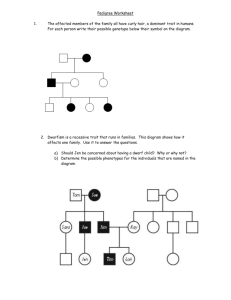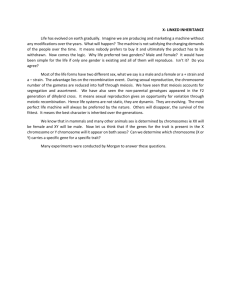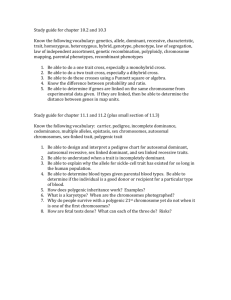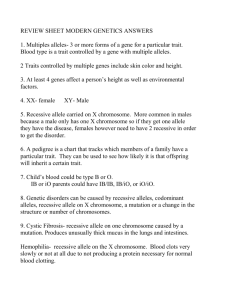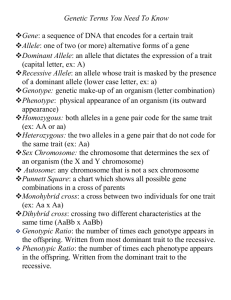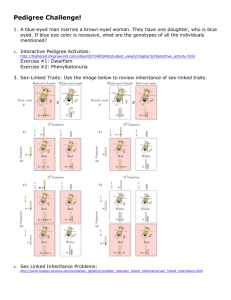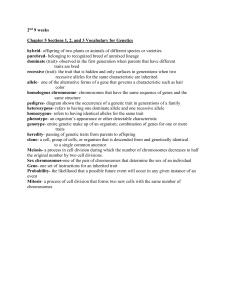Topic 4 – Sex Linked Traits Morgans Experiments In fruit flies red
advertisement
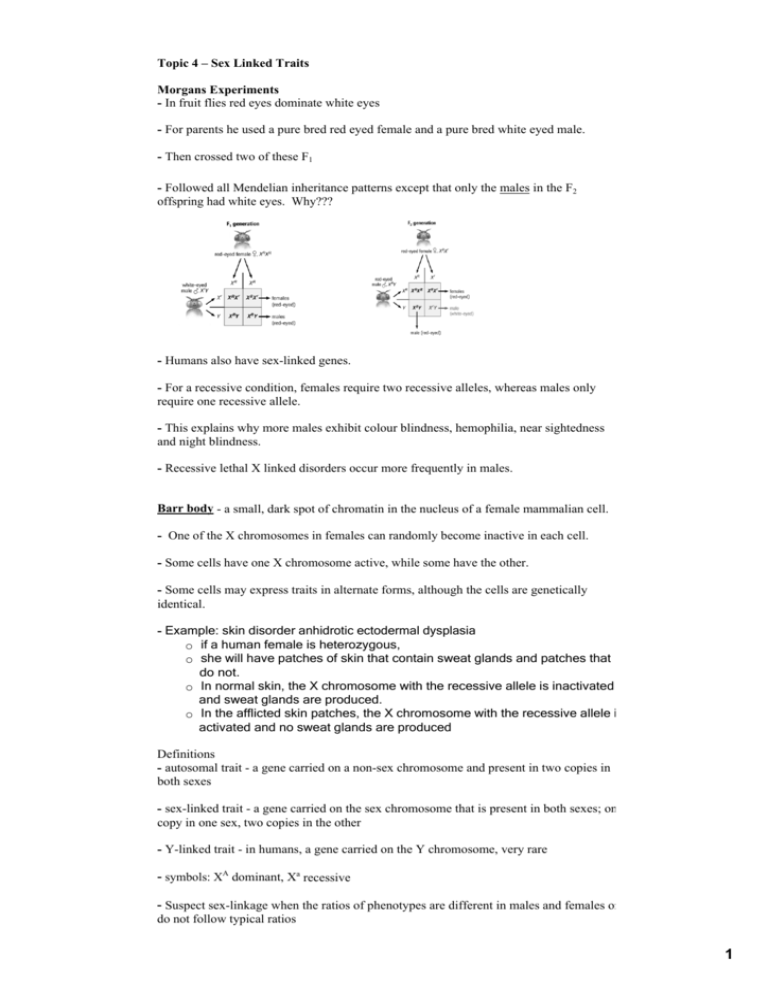
Topic 4 – Sex Linked Traits Morgans Experiments ­ In fruit flies red eyes dominate white eyes ­ For parents he used a pure bred red eyed female and a pure bred white eyed male. ­ Then crossed two of these F1 ­ Followed all Mendelian inheritance patterns except that only the males in the F2 offspring had white eyes. Why??? ­ Humans also have sex­linked genes. ­ For a recessive condition, females require two recessive alleles, whereas males only require one recessive allele. ­ This explains why more males exhibit colour blindness, hemophilia, near sightedness and night blindness. ­ Recessive lethal X linked disorders occur more frequently in males. Barr body ­ a small, dark spot of chromatin in the nucleus of a female mammalian cell. ­ One of the X chromosomes in females can randomly become inactive in each cell. ­ Some cells have one X chromosome active, while some have the other. ­ Some cells may express traits in alternate forms, although the cells are genetically identical. ­ Example: skin disorder anhidrotic ectodermal dysplasia o if a human female is heterozygous, o she will have patches of skin that contain sweat glands and patches that do not. o In normal skin, the X chromosome with the recessive allele is inactivated and sweat glands are produced. o In the afflicted skin patches, the X chromosome with the recessive allele is activated and no sweat glands are produced Definitions ­ autosomal trait ­ a gene carried on a non­sex chromosome and present in two copies in both sexes ­ sex­linked trait ­ a gene carried on the sex chromosome that is present in both sexes; one copy in one sex, two copies in the other ­ Y­linked trait ­ in humans, a gene carried on the Y chromosome, very rare ­ symbols: XA dominant, Xa recessive ­ Suspect sex­linkage when the ratios of phenotypes are different in males and females or do not follow typical ratios 1 2 Topic 5 – Pedigree Charts Notes ­ A pedigree chart is like a family tree in which the inheritance of a trait can be traced from parents to offspring Example People with albinism do not produce normal pigment levels. Albinism is a recessive trait. Use the pedigree chart in Figure 2 to answer the following questions. Use an uppercase “A” to represent the dominant allele, and a lowercase “a” for the recessive allele. ﴾a﴿ How many children do the parents A and B have? ﴾b﴿ Indicate the genotypes of the parents. ﴾c﴿ Give the genotypes of M and N. 3 Traits can be inherited through a few different ways ­ Autosomal Dominant Inheritance o If a trait is autosomal dominant you only need to get the gene from one parent in order for you to inherit the trait. o One of the parents must display the trait as well ­ Autosomal Recessive Inheritance o Both parents must be heterozygous for the trait, or one must have the trait and the other has to be heterozygous o Whenever a recessive phenotype shows up in a child of two parents with the dominant phenotype, both parents must be heterozygous for that trait ­ X – linked recessive o Traits determined by genes on the X chromosome o More males are affected b/c they only have one copy of the X chromosome, whereas females have 2 copies o Because women need two copies of recessive allele to show the disease, far fewer women affected than men Examples: Phenylketonuria (PKU) is a genetic disorder caused by a dominant allele. Individuals with PKU are unable to metabolize a naturally occurring amino acid, phenylalanine. If phenylalanine accumulates, it inhibits the development of the nervous system, leading to mental retardation. The symptoms of PKU are not usually evident at birth, but can develop quickly if the child is not placed on a special diet. The pedigree in Figure 3 shows the inheritance of the defective PKU allele in a family. (a) How many generations are shown by the pedigree? (b) How many children were born to the parents of the first generation? (c) What is the genotype of individuals 1 and 2, generation I? (d) How is it possible that in generation II, some of the children showed symptoms of PKU, while others did not? (Hint: Use a Punnett square to help with your explanation.) (e) For individuals 6 and 7, in generation II, a child without PKU symptoms was born. Does this mean that they can never have a child with PKU? Explain your answer. 4 5 6 7
